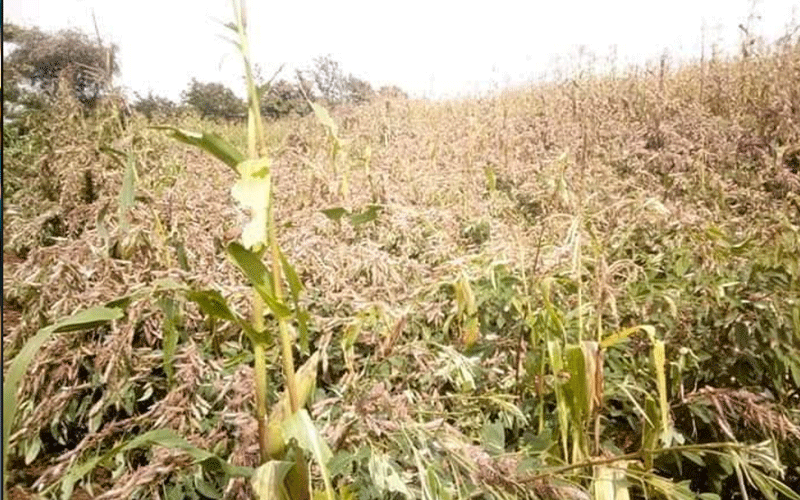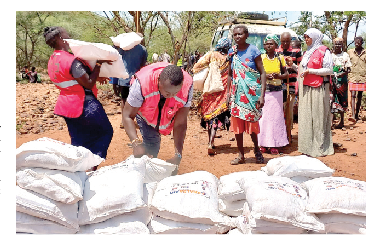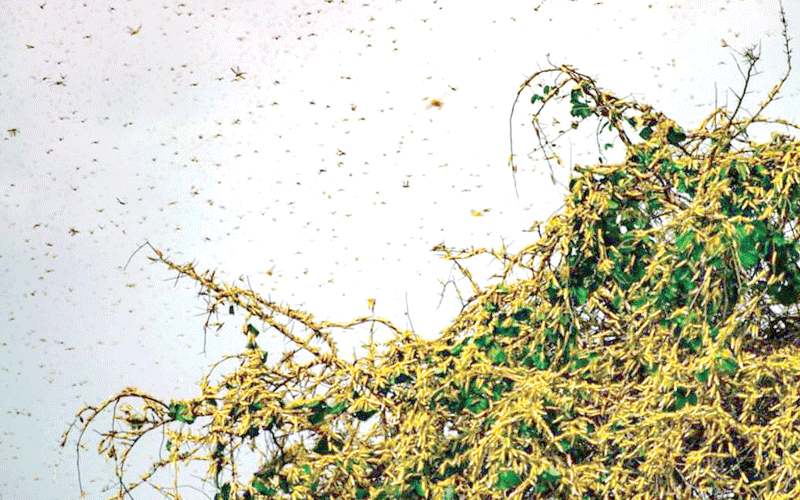Kitui farmers seek State payout over crop destruction by locusts

It is a week now since huge swarms of desert locusts invaded Kitui county and farmers are counting losses.
The pests are believed to have entered the county from Mwingi North constituency, which borders Tana River and Tharaka Nithi counties.
Cases of crop damage have been reported in Tseikuru, Ngomeni, Nguni and Kyuso sub-counties.
Despite aerial spraying that has been conducted thrice in Mwingi, the locusts are still spreading and destroying crops even as farmers try to use manual methods to eradicate them.
Esther Kyalo, a farmer from Nguni, says she expected to harvest more than 10 bags of green grammes, but now she has nothing to harvest as the locusts have destroyed the crop. She is now calling upon the government to compensate her for the loss.
Bumper harvest
“It is so unfortunate that God had blessed us this year with bumper harvest, but we are not going to harvest as we expected because locusts have eaten our crops,” she added.
Another farmer from Enziu area in Mwingi, Julius Maluki decried how they spend most of their time chasing the insects to stop them from feeding on their crops. Maluki pleaded with the government to compensate them.
In Tana River, about 12 hectares of vegetation have been destroyed by desert locusts since Sunday.
Residents said they have suffered losses following destruction of their maize and green grams that were just about to mature.
A resident, Mohammed Hassan said farmers in Dima village beat iron sheets to chase away the insects.
Meanwhile, Governor Dhadho Godana has criticised the government for slow response in containing the insects’ spread.
He said the locusts invasion could plunge residents into more crises since the region is at the moment recovering from floods where thousands of people were displaced by floods and urged the government to act.
Food shortage
The farmers’ cries come even as the government allayed fears of food shortage because of the ongoing locust invasion in some parts of the country.
Environment and Forestry Chief Administrative Secretary Mohammed Elmi said farmers are expected to harvest enough food to sustain the market demand.
“There is no cause for alarm as the locust invasion came when crop was almost mature,” he said.
Speaking during the opening the 54th Greater Horn of Africa Climate Outlook Forum, the administrator said the government is dealing with the invasion to avert complete loss of crops in the fields.
Meanwhile, about 280 million to 560 million desert locusts have been killed through spraying in Kenya, The Food and Agriculture Organisation of the United Nations has said.
Terming the locusts in the country and other Eastern Africa countries a threat to food security, FAO Subregional Coordinator for Eastern Africa David Phiri said the invasion would turn into a plague.
“There is concerted effort by all stakeholders to eliminate the locusts where through spraying, about seven swarms have been eliminated,” he said on Friday. -Reporting from Margaret Kimathi, Reuben Mwambingu, Jasmine Atieno and Bernard Gitau













